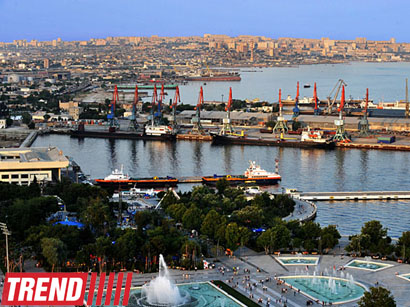Azerbaijan, Baku, Nov. 1 / Trend I.Khalilova /
It is unlikely that any country will agree to enter a group of countries to create a common currency zone, the head of the Azerbaijan Bank Training Center Javanshir Abdullayev told Trend on Thursday, commenting on yesterday's statement of Turkish Prime Minister Recep Tayyip Erdogan on plans to create a TL-zone which will be an alternative to the euro zone.
"All around the world there is the only practice of creating the euro zone, which wasn't successful. Countries in the euro area still can not come to agreement on a common tax and budget policy. Today, the only adjustable policy is monetary, which is not enough to regulate all the economic relations in the European Union, "Abdullayev said.
He said, based on this practice it is unlikely that any currency, which will become convertible, can be introduced as a single for the group of countries in the near future.
However, he thinks, provided creation of a balanced trade and payments balances, the use of national currencies in trade relations between two countries is promising.
"If these relations are not balanced, and the currency is inconvertible, it can cause serious problems," Abdullayev said. "So, a balanced trade and payment transactions are required for functioning of this system."
Azerbaijan received an offer to join the Eurasian Economic Community (EEC) and other organizations, but the country refused to participate in such associations.
Five countries have been EEC member states since the signing of the agreement on the creation of EEC on October 10 2000 in Astana.: Belarus, Kazakhstan, Kyrgyzstan, Russia and Tajikistan
A protocol on accession of Uzbekistan to the organization was signed on January 25 2006 . Since May 2002, Ukraine and Moldova have a status of EEC observers, Armenia received an EEC observer status in January 2003.
The Counselor of the Turkish Economy Minister Alparslan Uymaz told Trend on Thursday, that according to the project of TL-zone creation, the trade transactions among the member countries in the zone will be carried out in Turkish liras.
"Along with the local currency, the countries joining the TL-zone, will be able to trade with each other in liras," Uymaz said.
However, according to other Azerbaijani experts, the situation in foreign trade, when the share of the euro in importing countries is growing, and euro depreciates against the manat, is advantageous for Azerbaijan. Thanks to the interventions, the Azerbaijani manat continues annual trend of strengthening against the major currencies, the dollar and the euro.
And experts even do not exclude the probability of Azerbaijani Central Bank intervention in euro. [Today CBA intervention in the foreign exchange market of the country is carried out through manat and dollar interventions].
The Central Bank made the transition to the maintenance cost of the Azerbaijani manat march 11, 2008, by introducing a currency basket of U.S. dollar and euro. The structure of the basket in 2008 was determined at a ratio of 70 to 30 percent in dollars and euros, respectively. and in 2010 it was changed and defined in a ratio of 90 to 10 percent in dollars and euros, respectively.
This suggests that the central bank of the country continues to take steps to preserve the stability of manat, and the entry into a single currency zone on this background is unpromising for Azerbaijan.
Today, Azerbaijan's export operations in the vast majority are held in dollars, the euro's share is gradually increasing in imports. However, domestic banks virtually don't carry out transactions in euros because of the instability of the euro in the past two years.
"Given this situation, the question of entering of Azerbaijan into TL-zone or another currency area is not relevant. Besides the financial impact of the Turkish authorities on Azerbaijan is slight, and the use of the Turkish lira in the calculations still did not specifically discussed, we in fact do not need it as Azerbaijani manat is much stable than Turkish lira, at least for now.
Cooperation in other areas of financial activity also isn't discussed," the expert said.
According to them, this idea may be relevant to Azerbaijan in case of an active joint stock operations. And it is impossible for our securities to get on the Istanbul Stock Exchange unlike the Moscow Interbank Currency Exchange. Although the Istanbul Stock Exchange is a shareholder of BSE, it is a formality, since it does not consider the volumes of Azerbaijani stock market so serious, experts say. It is explained by the fact that the annual turnover of the Baku Stock Exchange accounts for two-day turnover of Istanbul Stock Exchange. Turkish investors can enter Azerbaijani stock market in case of quotation of strategic enterprises' shares, whereas today mainly emission shares of banks and insurance companies to raise capital are placed through the trading system of the stock exchange.
Furthermore, the impact of the global financial crisis on the economy and the banking system in Turkey was much stronger, while the Azerbaijani economy has only its consequences. This factor also speaks about the inexpediency of Azerbaijan's entering the TL-zone.






